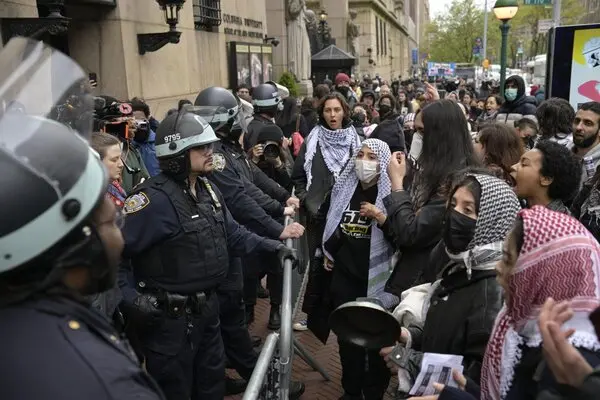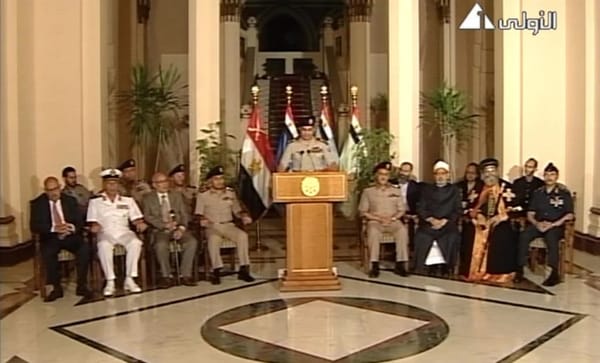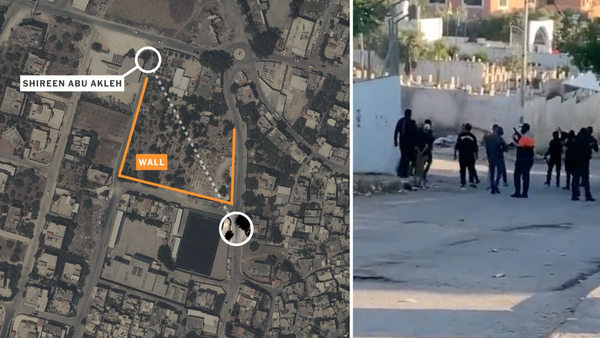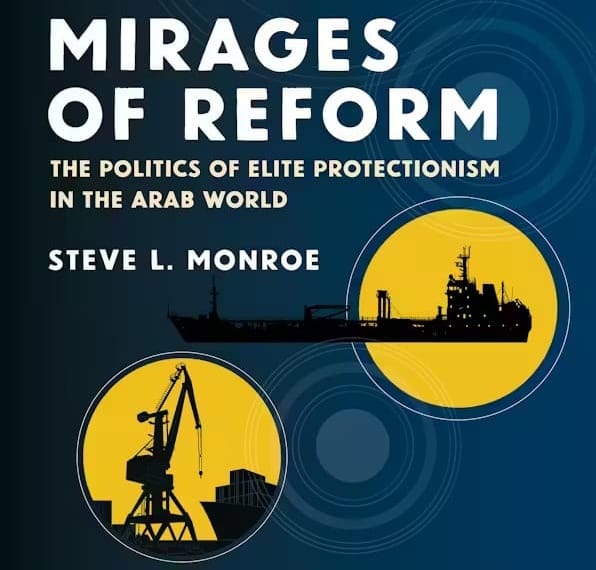Antisemitism crisis on campus? 85% of political scientists say no.

Plus, a rich new weekly roundup of scholarship on the Middle East.
As regular readers know, Shibley Telhami and I have for several years been tracking the views of Middle East academic experts about threats to academic freedom, antisemitism, and other critical campus issues. Today, Bright Line Watch released its own survey of political scientists (760 respondents) and the general public about the opening months of the Trump administration. This initiative is similar to our Middle East Scholars Barometer, but the survey goes out to a much broader range of political scientists and not just Middle East experts. That makes its findings on certain issues such as the prevalence of antisemitism and self-censorship especially interesting, and perhaps harder for some to dismiss.
Here's what the Bright Lines survey found: "A large majority of political science faculty – 85% – say antisemitism was not a problem (34%) or not much of a problem (51%) on their campus as of January 2025. A similarly large majority – 88% – say that policies in place at that time were somewhat (43%) or very effective (45%) in protecting their campus communities from antisemitism." That almost perfectly replicates the findings of our survey, when 21% of the Middle East experts said that antisemitism was a problem on their campus. Overall, the vast majority of political scientists – virtually all of whom would see real antisemitism, as opposed to criticism of Israel, as unacceptable and repugnant – see the Trump administration's crusade against alleged antisemitism as a thin veil for its broader attack on higher education and democracy.
How about self-censorship among this broader pool of scholars? Bright Lines Watch found that "half of faculty perceive decreases in academic freedom on the topics of the conflict in Israel/Palestine (43% decrease, 4% increase)". A majority of faculty report refraining from expressing themselves openly in extramural speech (55%); "of those who self-censor, most (71%) attribute their behavior to the political environment beyond campus or said campus-specific factors and broader factors weigh equally (22%). Only 7% cited campus-specific factors alone. Self-censoring faculty say they are motivated by concerns over harassment online and in person (64%), potential professional consequences such as loss of jobs or promotions (48%), legal sanctions such as prosecution or fines (26%), violence (19%), and social exclusion (16%)." That tracks with the MESB findings, though our Middle East experts seem to be more likely to self-censor and face harsher pressures than their non-Middle East focused peers. Virtually everyone in the survey (92%) views the Trump administration's pressure on Columbia, Harvard, and other universities as a threat to democracy.
There's a lot more in the survey about views of American democracy and other critical issues – see all the findings here.
And now.... your MENA Academy Roundup!
It's been a while since the Ghost of Abu Aardvark has done a proper roundup of recent articles and publications from Middle East scholars. This week, we selfishly start with two review essays which engage with my own work: Galen Jackson's thoughtful reading of Making Sense of the Arab State, and Stathis Kalyvas and Mikael Hiberg Naghizadah review essay on Islamism and Civil Wars, which takes up themes from our special issue on Islamists in the Middle Eastern Warscape. We then flag the publication of two new issues of critical journals: Syria Studies (which is what it sounds like) and Souffles Monde (a newly revived journal of Afro-Arabian Studies edited by Hisham Aidi and related to our Program on African Social Reseach). We then present a few clusters of publications: one featuring experimental methods in Morocco and in Israel-Palestine, and the other exploring online interventions in Israeli-Palestinian attitudes.
Stuff About Me
Galen Jackson has a really insightful review of Making Sense of the Arab State up at H-Net: "perhaps the most important point that emerges from the volume is that, according to most of the contributors, the perceived “weakness” of various elements of the states examined in the book is actually a function of deliberate strategic decisions on the part of Arab leaders, rather than a result of failed state-building efforts... Arab states are not so much “weak” as they are defined by “asymmetric institutional capacities,” which, according to Heydemann, is very much by design (p. 29). Seen in this light, it makes sense that states in the area possess strong security services, perform unimpressively in terms of economic growth, and, in relative terms, perform at an intermediate level when it comes to providing social services such as health care.
Making Sense of the Arab State has much to offer scholars and, in my view, even more so to students. Indeed, many of the contributions, as well as the themes of the volume as a whole, are ideal for teaching purposes, at both the graduate and undergraduate level. Specifically, how the book challenges Western notions of the state will help students conceive of different forms of governance, which makes it useful in courses on both comparative and Middle East politics. Perhaps even more useful is what it has to say about authoritarian politics: The volume’s analyses of the different political challenges that regimes confront, the methods they employ to deal with those challenges, and the varying contexts in which those methods are deployed are all topics worthy of discussion in the classroom. And because the case studies in each chapter are so rich in detail, I expect that most students will deeply engage with the book.
Despite these strengths, I did find myself thinking that Making Sense of the Arab State might take some of its core arguments too far, or at least in certain instances offers them without giving due consideration to some important competing explanations."
Find out what those are over at H-Net.
Next: I'm excited to see this review essay by Stathis Kalyvas and Mikael Hiberg Naghizadah, which picks up many of the themes from my essay with Jeroen Gunning and Morten Valbjørn in our recent special issue on Islamists in the Middle Eastern Warscape. You don't want to miss "Islamism and Armed Conflict," Annual Reviews of Political Science (May 2025). ABSTRACT: Islamism has become a dominant force across civil wars, the most common form of armed conflict. Yet our comparative and theoretical understanding of this critical political development is lacking. We discuss this phenomenon and describe its emergence and basic trends and patterns; we review existing accounts of its causes and dynamics and conclude by suggesting future directions for research, with an emphasis on integrating context-rich studies with comparative and theoretical approaches.
Two New Journals You Should Follow
Syria Studies has an outstanding new issue, "Trends in Syria Studies at a Time of Internal War". ABSRACT: This issue explores the impact of Syria’s internal war on research and analysis of Syria in the more the more than decade beginning soon after the outbreak of the Syrian uprising. Contributors write from the perspective of their own research and positionality as researchers from/of Syria. They explore such questions as: How do we conduct research amidst protracted war? What constitutes ‘the field’ when access to the country is virtually impossible for many of us? How are our research questions and methods shaped by the current state of protracted war? Abboud argues that the post-2011 period represents a new, fourth period that will shape Syrian state formation. Ghada Atrash’s essay forefronts how “epistemic activism” can disrupt knowledge production. Rula Jabbour examines the utility of Strategic Studies for iunderstanding the Syrian conflict. Sumaya Malas considers how the “post-conflict” framework discourages researchers from pursuing projects until conflicts are perceived to be over. Rimun Murad assesses the emergence of the war novel as a consequence of the conflict. Christa Salamandra’s reflection on ethnography on understanding Damascene elites. Uğur Ümit Üngör asks how the Syrian conflict has affected the conduct of wider international politics. Fadi Skeiker personal testimony centres on theatre as a practice of citizenship and social justice. Alexa Firat examines visual narratives of the conflict.
Souffles Monde, a journal focused on African-Arab connections partially supported by the Program on African Social Research, has just released a spectacular issue edited by Hisham Aidi based on a workshop in Morocco (and very much building on our Africa and the Middle East: Beyond the Divides project). From Aidi's introduction: "Of the neologisms coined by the late Kenyan-Omani historian Ali Mazrui, “Afrabia” is the most memorable. This was his attempt, inspired by W.E.B. Du Bois, to delineate an emancipatory geography of Africa that would include the Arabian Peninsula. Mazrui would observe that Madagascar - which is separated from the African continent by the 500-mile wide Mozambique Channel - is considered part of Africa, while Yemen, which is only “a stone’s throw” from and boasts age-old migratory, commercial, and cultural ties to the Horn of Africa, is not (Mazrui, 1986, p. 28-9; Mazrui, 1992). Mazrui, who spent much of his career reflecting upon the shared histories and futures of Africa and the Arab world, would also popularize the term "Afro-Arab." He deployed this concept to describe not only "Black Arabs" or what he’d call “Afrabians,” but also to refer to geographic overlay, ethnolinguistic mixing, and the solidarity projects of 1970s and 1980s that tried to promote inter-regional cooperation and combine pan-African and pan-Arab nationalism (Amin, 1986; Akinsanya, 1976). This issue of Souffles uses Mazrui's concept of Afro-Arab as a point of departure to examine a range of encounters and phenomena from the legacies of slavery to colonial attempts to institutionalize "African" and "Arab" as separate political identities and attempts to create an Afro-Arab nationalism that joins Arabism with pan-African political thought."
Two Experiments in One Top Journal
Carolyn Barnett, Alexandra Blackman, and Marwa Shalaby, "Gender Stereotypes in Autocracies: Experimental Evidence from Morocco," Journal of Politics (May 2025). ABSTRACT: How do gender stereotypes shape voters’ evaluations of female politicians in autocracies? Despite increased women’s representation in autocracies, we know less about the link between gender stereotypes and voters’ assessment of female politicians in these contexts because findings on political gender stereotypes are mostly drawn from established democracies. This registered report draws on a nationally representative survey with an embedded conjoint experiment to examine how voters evaluate female politicians’ competency in a conservative electoral autocracy: Morocco. We argue that stereotypes would lead voters to generally view female politicians as less competent but that competency ratings would improve when women were described as assertive or ambitious, focused on priority issue areas, highly productive, or effective at clientelistic service provision. We find weak evidence that respondents evaluate male politicians more favorably and no evidence that gender stereotypes play a central role in shaping voters’ evaluations of either male or female politicians.
Chagai Weiss, Alexandra Siegel, and Alexandra Scacco, "Outgroup Avoidance," Journal of Politics (May 2025). ABSTRACT: Encouraging engagement with outgroup perspectives is a popular strategy to improve inter-group relations. But in deeply divided societies, individuals often actively avoid outgroup members. In a Facebook field experiment, we embedded Palestinian posts in Jewish Israelis’
Facebook timelines for a period of 14 days. We find no effect on attitudes toward the outgroup and a modest decrease in subsequent consumption of outgroup content, a pattern we attribute to participants’ avoidance of constructive engagement. To better understand this avoidance, we conducted a set of survey-embedded behavioral tasks. Results suggest that outgroup avoidance online is widespread, associated with outgroup prejudice, explained by feelings of discomfort, anger, mistrust in outgroups, and pessimism, and challenging to overcome. Our findings indicate that avoidance is a barrier to constructive intergroup engagement in naturalistic settings, rendering many interventions that may be effective in controlled environments difficult to implement or scale in practice.
Two Articles on Saudi Identity
Betul Dogan-Akkas, "Reclaiming ‘Saudiness’: Space, Discourse and Securitisation in the Kingdom of Saudi Arabia," International Spectator (March 2025). ABSTRACT: Under the current leadership of Crown Prince Mohammed bin Salman (MbS), the power and legitimacy of the Saudi state have undergone a transformation that manifests itself in multiple forms. The (re-)ordering of space and society has been a central discussion in the Kingdom of Saudi Arabia (KSA) in recent years with several unique examples of transformation. An imaginary of new ‘Saudiness’ has been securitised by re-ordering certain spaces in the Kingdom that are either important to the everyday life of locals or for the historical legitimacy of the regime. Three conditions for re-ordering of ‘Saudiness’ are identified: a recognition of societal transformation and economic needs; the institutionalisation of MbS’s de jure leadership with absolute authority; and defining ‘Saudiness’ while dislocating other sources of national legitimacy. The burgeoning Saudi tourism and lifestyle are two signifiers that constitute this new Saudi imaginary. Against this backdrop, the politics of space, security, legitimacy and discourse is examined to shed light on the imaginary of new ‘Saudiness’ by combining a post-structural inquiry of securitisation with Doreen Massey’s space theory.
Andrew Michael Leber, "Saudization in a “Saudi First” kingdom," Asian and Pacific Migration Journal (May 2025). ABSTRACT: How have efforts to “nationalize” workforces in the Arab Gulf monarchies affected citizen and expatriate employment in these economies? In Saudi Arabia, policies such as the Nitaqat quota system clearly generate jobs for citizens, yet exhibit diminishing returns in the longer term even as they impose considerable costs on expatriate workers—limiting job opportunities and take-home pay. This paper draws on Saudi labor-market statistics to assess changes in Saudization (i.e., workforce nationalization in Saudi Arabia) over the past decade and a half, noting in particular recent changes under the Vision 2030 program of socio-economic change championed by Crown Prince Mohammed bin Salman (MBS). Findings point to notable yet circumscribed gains for Saudi employees that impose new competitive pressure, costs and risks on expatriate workers without fundamentally challenging the Saudi economy’s reliance on non-citizen labor.



